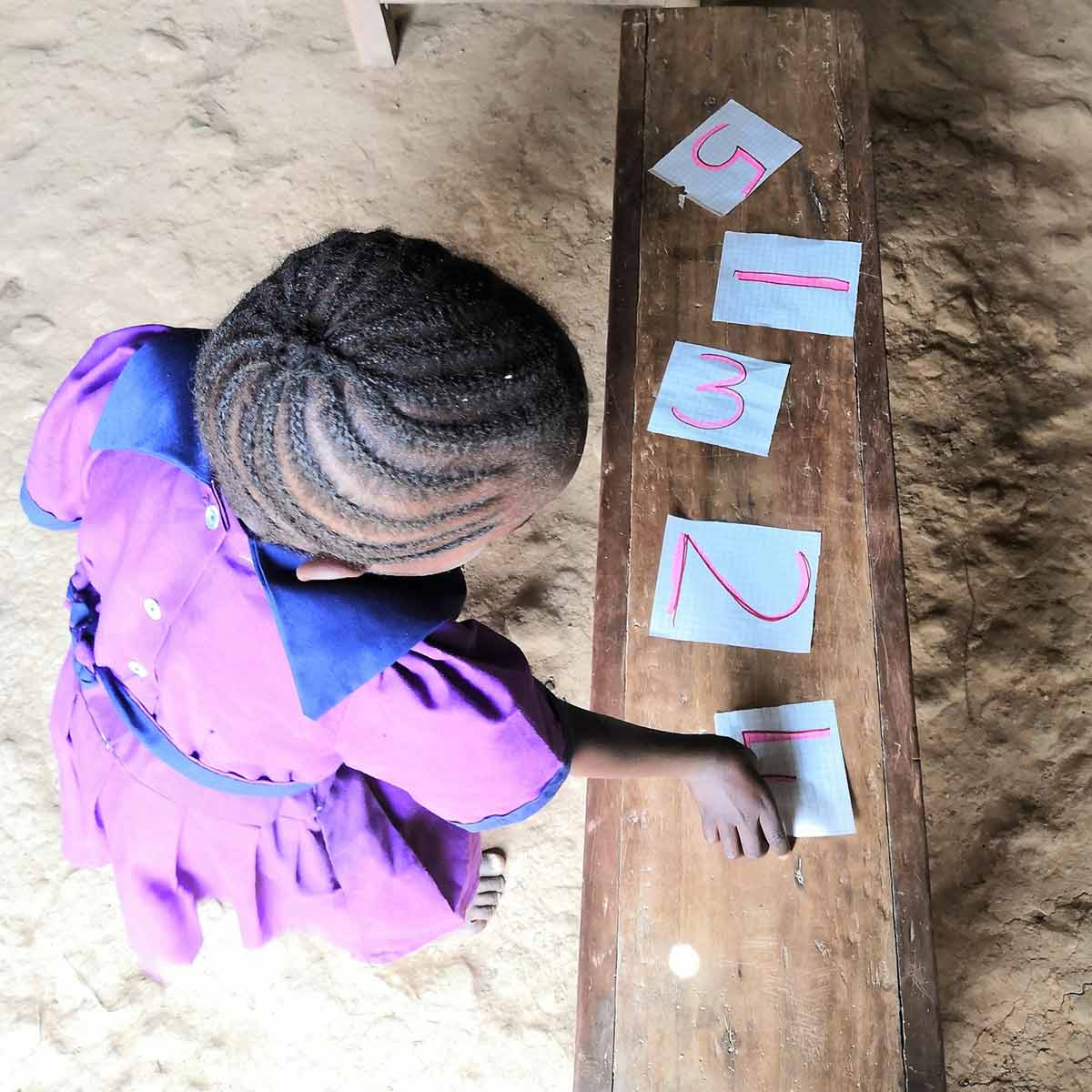In this article, Harriet outlines a practical training programme for early childhood development and education teachers. It supports the development of creative teaching and learning approaches and promotes collaboration between colleagues and with parents.
Background
Western Kenya is rural yet densely populated. Beyond the cities, most residents rely on subsistence farming and their families are large. Education is viewed as the ‘route out of poverty’ and huge sacrifices are made to send children to school, starting with their early childhood development (ECD). Many rural community schools (which receive no government funding) employ teachers who have no formal training and ECD lessons consist of copying letters and numbers from the blackboard into exercise books.
Pursue is a community-based organisation that works with these schools to run regular teacher development workshops and provide mentoring to improve the quality of teaching and learning. The seminars help teachers understand how they can better support all their students to learn in a variety of ways.
Seminars for teachers
The Teacher Development Seminars (TDS) programme runs for an academic year, consisting of weekly two-hour seminars during term time. These bring together teachers from primary schools across a geographical area. The training sessions cover topics such as questioning, differentiation, formative assessment, guidance and counselling, and improving literacy skills. Training sessions are practical and discussion-based, giving teachers plenty of opportunities to learn from each other and share experiences.
Every teacher on the TDS programme has an initial classroom observation when joining the scheme. Throughout the year, Pursue education staff visit the partner schools regularly to provide informal classroom observations and feedback. They also offer support in areas such as lesson planning or behaviour management.

Within the wider TDS programme, in 2019 Pursue provided 5 ECD-specific training sessions. The ECD seminars focus on a range of topics: play-based learning and its role in child development; how to engage children through storybooks, such as using the pictures to stimulate discussion and develop language skills; and interactive methods of phonics teaching.
During the seminars, teachers are able to take part in the activities being discussed and understand their own learning styles. This helps them discover the value of using a range of techniques to teach ECD concepts and using resources that are readily available and cost nothing. In the classroom, teachers begin to use real-life objects like stones and sticks to teach counting. Students are encouraged to use role-play, and group work is included in lessons as teachers recognise the value of supporting students to collaborate with their peers.
In addition, seminars explore how questioning can help to develop children’s thinking skills, even in ECD classes. Prior to the seminars, some teachers felt that ECD-age children were too young to engage with open-ended questions, such as “Can you think of some words that begin with sound C?”. After looking at how different types of questions can greatly aid learning for children, teachers are now seeking to integrate more open-ended questions into their lessons, and direct appropriate questions to specific learners.
Community collaboration
Parents at Pursue’s partner schools often expect learning to involve writing; ‘playing’ can be viewed as a waste of time. Children are expected to show writing in their exercise books every day, regardless of their age. Consequently, Pursue organises parents’ days at partner schools – providing parents with the opportunity to discuss how to assist their children’s learning at home, and learn about the techniques that ECD teachers use to aid learning for all children.
At these community days, the assumption that learning all happens at school is challenged. Parents are encouraged to take a role in their children’s learning, and we work together to help them understand that illiteracy does not mean they cannot assist their children. Pursue staff model how parents can engage children in learning at home, for example, counting the sticks when collecting firewood, or encouraging children’s creativity by making patterns from beans or maize.
Putting it into practice
As part of the programme, teachers are mentored by Pursue staff for the duration of the year, after which they join the alumni programme which consists of monthly meetings with other alumni to share best practice. This mentoring is carried out by Pursue Education staff and involves regular coaching meetings and classroom observations, to encourage implementation of techniques learnt. Although the schools have severely limited resources (usually only a blackboard), teachers are encouraged to be imaginative in catering to the needs of all students by providing opportunities to see, hear, touch, question or discover as part of their learning.
Some examples of new techniques seen in the ECD classes include:
- Children worked in pairs to create triangle, square and circle shapes using maize kernels.
- Role play was used by children learning about different family members.
- Children created a visual mind map of domestic animals.
- The teacher gave children cards with numbers written on them. The children were challenged to sort the cards into order from the smallest to largest number.
- A school created a shop area, where children could pretend to be purchasing various items.
It has been encouraging to see the change in both mindset and teaching style among the ECD teachers, as they implement more engaging and play-based learning into their classrooms, catering to a range of different learning styles.

Ongoing support
By bringing teachers together for weekly seminars, the TDS programme enables small rural schools to forge connections with other similar schools, share best practice and learn from each other. Upon completion of the year, teachers graduate to the alumni programme. The alumni network encourages teachers to take more ownership of their professional development through activities such as peer observation or teachers leading parts of a training session.
Contact:
Harriet is Education Director at Pursue.
Email: info@pursue.org.uk.
Website: www.pursue.org.uk
